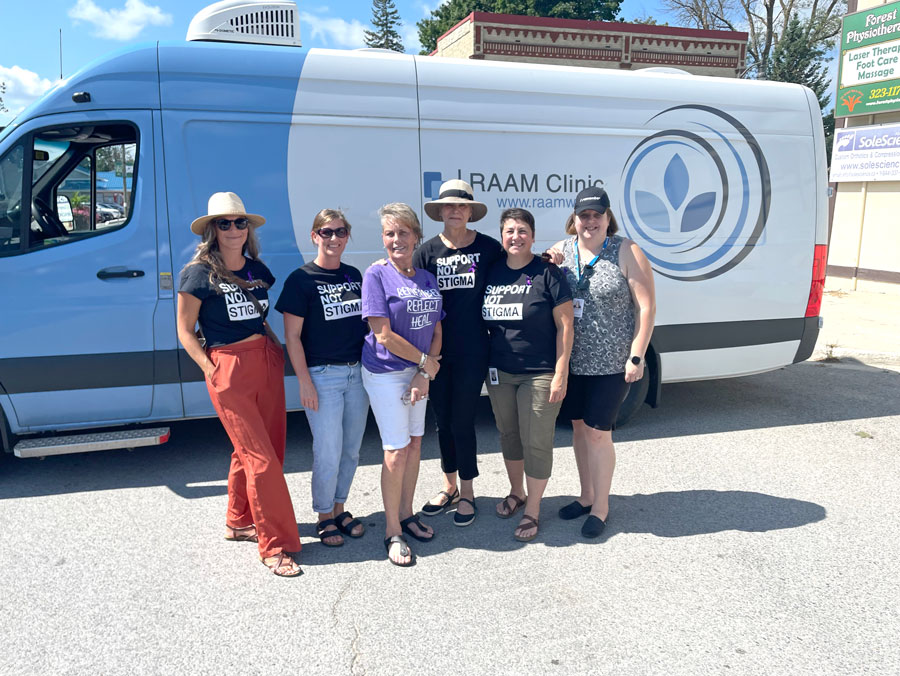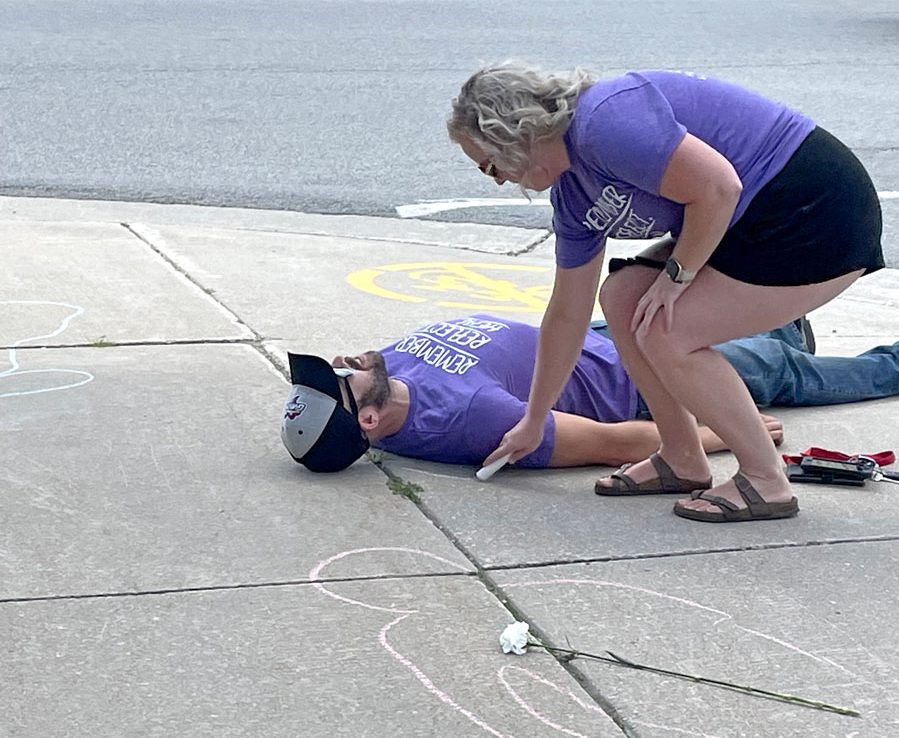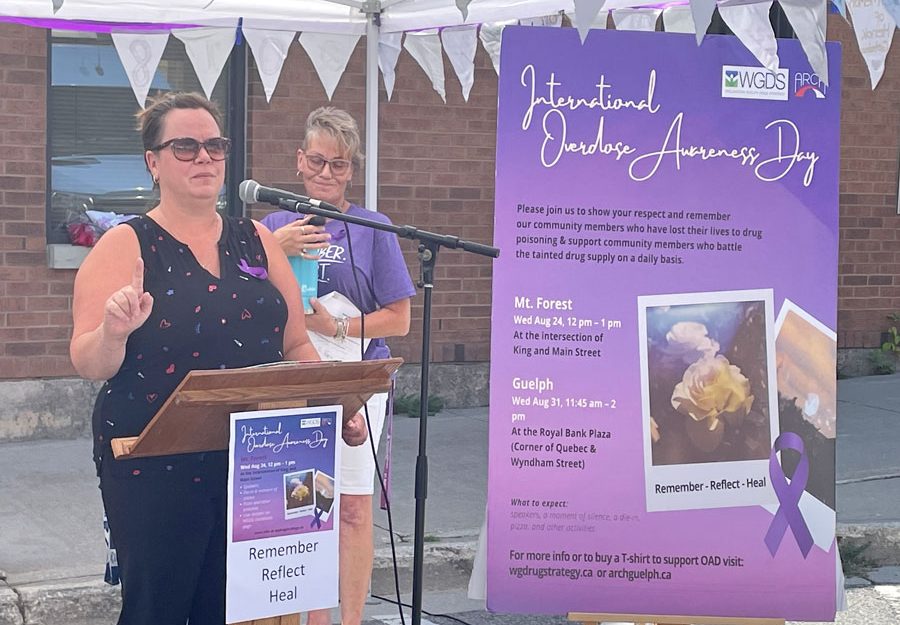MOUNT FOREST – International Overdose Awareness Day (Aug. 31) was marked with a Stop the Stigma rally here on Aug. 24.
The theme of the event, organized by the Wellington Guelph Drug Strategy, ARCH Guelph, Stonehenge Therapeutic Community and the Rural Wellington Community Team was “Remember, Reflect and Heal.”
“Friends, family and loved ones who find themselves addicted to opioids continue to dance with deadly substances like fentanyl and other unknown fillers that have been put in a particular batch of street drugs,” Karen Lomax, overdose prevention co-ordinator with ARCH Guelph, told about 50 people who gathered for the noon-hour event on King Street in downtown Mount Forest.
Lomax shared from her own experiences as a former opioid user.
“I can remember the physical pain of opioid withdrawal. I’d birth babies before I’d go through that pain again,” she said.
“So why would someone ever take this stuff in the first place? Well, some of us were prescribed these medications for medical conditions and once addiction reared its ugly head the prescriptions got cut off and you’re left to fend for yourself or go into withdrawal,” Lomax continued.
“So now you have two debilitating conditions. The first condition, which was bad enough to warrant an opioid medicine in the first place, and now addiction and no help medically.”
Once forced to look for non-medical sources, Lomax said addicts can find themselves exposed to dangerous illegal mixtures, such as fentanyl from bootleg sources.
“It’s 100 times stronger than morphine. You need two grains the size of salt to kill a non-addicted person. It’s killed more people than automobile accidents. It’s killed more folks than breast cancer,” she stated.
Lomax said the availability of unregulated drug mixtures means users know every dose could be their last.
“Having unregulated fentanyl on the streets, people are playing a deadly game of Russian roulette,” she stated.
“I know if this stuff was available when I was using, I would be a statistic,” said Lomax.
Lomax also pointed out such deaths are not as rare as many imagine.
“The National Safety Council has found the lifetime odds of death from fentanyl overdose or opioid poisoning were greater than the risk of death from falls, pedestrian incidents, drowning and fire,” she stated.
Opioid addicts, Lomax said, are often unfairly depicted as willing drug users.
“I hear folks say it’s their choice – they choose to be addicted. Maybe it started out as a choice, a choice of yes and no. Maybe there wasn’t a choice. Maybe life was so hopeless there was no choice in their mind … Maybe the pain from an illness was so horrific that a pain med was their only hope and they took what was prescribed and it steamrolled from there,” she explained.
“Does it really matter how it started? Not anymore. Let me assure you, there was not one day in my addiction where I woke up and said, ‘Today’s great day to be an addict. I’d love to lose my children. I definitely would love to lose my home. And I’d love to lose my soul to addiction.’ Not one day was that something I wanted,” she added.

A Stop the Stigma rally for Overdose Awareness Day was organized in Mount Forest with cooperation from several local agencies. From left: Olivia Kijewski, Wellington Guelph Drug Strategy; Catherine Sullivan, Stonehenge; Karen Lomax, ARCH Guelph; Adrienne Crowder, Wellington Guelph Drug Strategy; Elsa Mann, Rural Wellington Community Team; and Chris Sciascetti, Stonehenge.
Some in attendance had lost loved ones to drug overdose, including Elizabeth Dexter whose brother died of a heroin overdose.
“He was 40 years old, engaged, a brand-new life. He had overcome addiction for 10 years and just wanted that one, last party. It shouldn’t have killed him,” said Dexter.
“Fentanyl is deadly. Fentanyl kills and it took my brother,” she added.
Dexter pointed out its easy to look at a someone struggling with addiction, and say, “What have you done to yourself? How could you do that to yourself?’
“It’s so easy to pass judgment. Instead of all that judgment, we need to focus on the addiction, the illness and love the addict, not push them away,” she explained.
Dexter said people often have misconceptions about how others end up as drug users.
“We didn’t come from a terrible upbringing and addiction found my brother,” she pointed out.
“My brother suffered from mental health, but to look at him he was successful. He was employed, engaged, financially stable – but he struggled,” she added.
Dexter said addiction only ever ends in one of two ways.
“Eventually addiction will lead to death, or it will lead to recovery. It doesn’t depend on that person. It depends on the community, depends on all of us helping them get through that. We need to support people, without judgment. Tainted, poisonous street drugs took my brother. One night shouldn’t have killed him. He should still be here today.”
Dexter urged everyone to focus on helping, not judging.
Unless you’ve walked in an addict’s shoes, you can’t fully understand the depth of desperation … Recovery is a journey, one full of friends and hope … Addiction is a killer, one that kills the soul,” she said. “Recovery is the answer. It helps you rebuild your soul.”

Chalk outlines were a reminder of lives lost to overdose at a Stop the Stigma Rally in Mount Forest on Aug. 24.
The event also included a moment of silence to remember those who lost their lives to overdose and a “die in” with participants laying on the sidewalk to have their bodies outlined in chalk to represent those who have died.
“The whole goal of being part of this today is to start a new conversation,” said Elsa Mann of the Mount Forest Family Heath Team’s Rural Wellington Community Team.
“I think we have been really relieved to see that the conversation about mental health has been changing over the years. We are seeing that stigma change,” said Mann.
“Our hope is that by hosting events such as this, that everybody here will go home and start one conversation and that slowly, over time, that stigma around substance use or addiction or harm reduction is going to change.”
Numerous organizations that provide support for those dealing with mental health and other issues were on hand at the awareness day. Mann noted that although help is available, those in need often don’t know where to turn.
She urged anyone in that situation to check out helpisherewellington.com. The website offers connections to supports for mental health and well-being available to residents of Wellington County.




